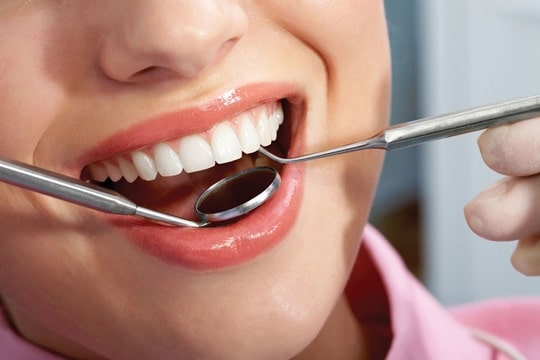Scaling & Polishing
Scaling and polishing are two of the most prevalent dental procedures intended to prevent disease or prophylaxis. Brushing the teeth at least three times a day or after every meal is recommended to prevent teeth damage. However, there are instances where tartar and plaque buildup can still occur.
The mouth and teeth both have bacterial film. As you eat, food is converted into sugar or starch which in turn combines with bacteria. As this cycle continues, the teeth is exposed to a more acidic environment. This can result to staining and even damage to the enamel as well as the roots.
That being said, regular flossing and brushing won’t often suffice. It should be complemented with more thorough dental procedures like dental scaling and polishing.
What is dental scaling?
Dental scaling is done routinely to help patients with excessive plaque buildup and gum disease. While the standard cleaning will cover the surface of the tooth, dental scaling will do so much more.
Scaling is also a type of dental cleaning designed to reach below the gum line so plaque buildup is removed. Dental scaling is also sometimes referred to as deep cleaning. In other words, this type of cleaning goes beyond the conventional cleaning received during regular dental checkups and annual visits.
What is teeth polishing like?
When there are layers of plaque buildup on the teeth, they can harden and turn into a hard mineral substance known as tartar. Because bacteria can live beneath tartar and can cause gum and tooth diseases, the tartar is removed through scaling.
After the tartar has been removed, the teeth is polished to make them smooth and shiny and to remove surface stains. Teeth polishing is sometimes considered the finishing touch of a protective dental treatment.
Teeth polishing is a painless dental procedure. A soft and small rubber cup for teeth polishing is used during the process. For patients who have severe stains, an air polishing system may be used. It is a mix of pressurised water and air mixed with an abrasive dental agent.
In some cases, selective teeth polishing is performed. In a similar scenario, only those teeth with remaining stains after scaling is polished. Another alternative that might be considered is therapeutic polishing. The dental procedure will remove bacteria from the roots of the teeth that are exposed during dental surgery.
Teeth polishing pastes used during the dental procedure are sometimes called trophy pastes. The term is an abbreviation for prophylaxis. Dentists will choose between medium, fine, and coarse pastes for the dental polishing.
While medium and coarse pastes are often seen as more effective in removing stains, they can also roughen and scratch the tooth enamel. Fine pastes for dental polishing on the other hand are considered less damaging and can bring about a more highly polished finish.
When do I need dental scaling?
Everyone will have some form of plaque buildup at one point or another. Each time you eat, acids, sugars, and tiny particles will stick to the bacterial film and will create a buildup known as plaque.
Bacteria that lives in the plaque can cause tooth decay and gum disease. Flossing and brushing, can help remove the plaque and prevent other serious problems from developing. Regular dental appointments of scaling and polishing will do the trick as well.
If your gum is healthy, tissue will fit tightly around the tooth, keeping the plaque out. However, when you have gum disease, the tissue will loosen. Typically, healthy gums are attached to the tooth at 1 to 3 millimetres below your gumline. This can be maintained by scheduling dental appointments consistently.
When you have gum disease, deeper pockets will start to develop, which signifies a need for scaling and polishing. The pockets can also get filled with plaque and may lead to other problems like bad breath. If you will have pockets that are 4 millimetres or more, dental scaling is often recommended in order to treat the gum disease and remove the plaque beneath the gumline. As for dental polishing, not only will it significantly improve the look of your teeth, it also removes unwanted plaque and biofilm to create healthy gums.
What can I expect during a dental a dental scaling procedure?
For those who have sensitive gums, dental scaling can be uncomfortable. Prior to this dental procedure, a local anaesthetic may be https://www.1728dental.com.sg/wp-content/uploads/2020/12/chasmerdeka_raj-1-1.jpgistered to numb the gum tissue so that scaling is comfortable.
It is recommended that patients talk with their dental care provider about their desensitizing options especially if they are concerned about discomfort or pain during the scaling procedure.
Dental scaling can require several visits and each one will cover a different portion of the mouth. While some dentists will opt to perform this dental procedure in two halves, others will prefer to divide the mouth into four quadrants.
For those who are nervous about the process, it is recommended that they check with the dentist if the scaling procedure can be done in a single session. While this is not a feasible option in most cases, it may be possible for those who only have minimal gum issues and are willing to go through a rather lengthy dental scaling procedure.
What can I expect after a dental scaling procedure?
After dental scaling, the mouth can feel sensitive and sore. Some patients will also experience some bleeding or swelling (at least for a few days) following the scaling procedure. The dentist may suggest a desensitising toothpaste to help ease out any pain or discomfort associated with scaling.
A prescription mouthwash may also be prescribed for use after this dental procedure to help keep the gums clean. It is also vital that proper flossing and brushing is observed after dental scaling to prevent plaque from forming in the same areas again.
After the scaling procedure, another visit to the dentist will be scheduled to measure the depth of the gum pockets, examine the gums, and to check if the mouth is healing properly. If the gum pockets have gotten deeper since this scaling procedure, additional dental treatment alternatives might be explored to address the issue.
Scaling is a common dental treatment for patients suffering from gum disease. Scheduling dental scaling when needed will not only help effectively ward off plaque, but it can also help maintain a cleaner and healthier mouth.
What can I expect during a dental a dental scaling procedure?
For those who have sensitive gums, dental scaling can be uncomfortable. Prior to this dental procedure, a local anaesthetic may be https://www.1728dental.com.sg/wp-content/uploads/2020/12/chasmerdeka_raj-1-1.jpgistered to numb the gum tissue so that scaling is comfortable.
It is recommended that patients talk with their dental care provider about their desensitizing options especially if they are concerned about discomfort or pain during the scaling procedure.
Dental scaling can require several visits and each one will cover a different portion of the mouth. While some dentists will opt to perform this dental procedure in two halves, others will prefer to divide the mouth into four quadrants.
For those who are nervous about the process, it is recommended that they check with the dentist if the scaling procedure can be done in a single session. While this is not a feasible option in most cases, it may be possible for those who only have minimal gum issues and are willing to go through a rather lengthy dental scaling procedure.
What are some of the precautions before teeth polishing is performed?
For patients with gum recession and an exposed cementum, the use of a mild polishing paste is often recommended by dentist so that sensitivity to the tooth surface is avoided. For those with other dental problems like untreated cavities, diseased or receding gums, teeth sensitivity, and exposed roots or dentins, it is recommended that the oral issues are resolved first before the teeth is scaled and polished in a dental appointment.
Teeth polishing is also not a recommended dental option for people with hypertension, respiratory problems, allergies to abrasive agents, and other conditions that weaken the enamel of the teeth.
While teeth polishing is not a required dental treatment, it can help those who would like to develop exceptional oral care habits and would like to feel confident about the look of their teeth. Before having the polishing procedure done, consider it best to discuss the matter with your dentist first so you can decide if it is the best option for you.
How much does a scaling and polishing treatment cost?

















